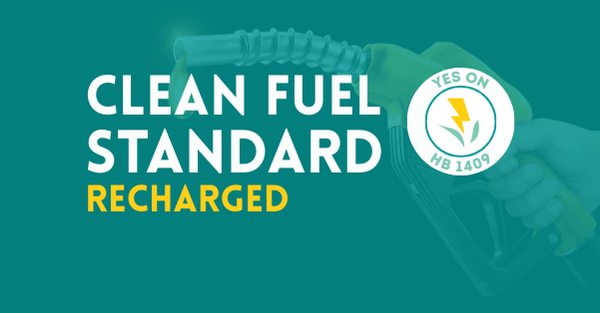OLYMPIA, WA—On April 15, 2025, the Washington State Senate voted (25-23) to pass HB 1409 Concerning the Clean Fuel Standard (CFS), significantly improving Washington’s clean fuels program. The vote comes against the backdrop of recent federal attempts to stop state climate action, which has climate leaders and advocates naming state and local policymaking as the “final line of defense.”
House Majority Leader Rep. Joe Fitzgibbon (34th LD) was a key champion in getting the initial Clean Fuels program passed in 2021, and led this year’s push to pass an upgrade to the existing program. “With HB 1409, Washington is taking the next big step forward towards a clean transportation sector that protects our climate, our air quality, and our local economies,” he said. “Cleaner fuels will pay dividends for Washingtonians for years to come and further cement our status as a state leading the pack on climate action during a time of federal inaction and backsliding.”
Notably Washington State is home to a number of working climate programs and policies that are strongly supported by voters, actively investing millions of dollars in communities, and very likely to draw the ire of the Trump administration’s latest directive to block and dismantle state climate policies.
HB 1409 brings significant gains for Washington’s transportation system, everyday drivers, and families living near roadways, with stronger reductions in transportation pollution and bigger investments in the transition to electric mobility. This will include more reinvestments in EV charging and incentives from utilities, local job creation, and cleaner choices for Washington consumers with a better market for EV charging companies to install public charging in WA, and increased sustainable biofuels.
“Transportation pollution is still a huge issue in Washington and upgrading our clean fuels program will keep up the critically important work of cutting climate pollution, strengthening our state’s clean energy economy, bolstering local jobs, and cleaning up our air,” says Leah Missik, Acting WA Director of Climate Solutions. “And we can all be proud that Washington continues to double down on climate action, especially in the face of ridiculous federal attacks on our efforts to improve people’s lives and make good on the promise of a cleaner, healthier future.”
Transportation is still Washington’s largest source of climate pollution, responsible for 40% of total emissions. The CFS is Washington’s best bet at reducing transportation pollution and transitioning to cleaner vehicles—it requires transportation fuels used across the state to become cleaner over time, while also investing in low-carbon biofuels and expanding electric vehicle charging. By 2034, the current CFS could reduce Washington’s greenhouse gas emissions by 4 million metric tons annually; the update passed this year could possibly double these pollution reductions. A stronger CFS would also significantly reduce toxic air pollution: The Puget Sound Clean Air Agency’s recent air toxics study confirmed that diesel exhaust alone, specifically from diesel engines, accounts for over 80% of the potential cancer risk from all air toxics. And these impacts are not universally shared: communities of color and people living on lower incomes have higher exposure to diesel exhaust as they are often located in proximity to major roadways and transportation corridors.
“HB 1409 isn’t just about reducing emissions—it’s about centering equity in Washington’s clean energy transition. This bill ensures frontline communities and diverse small businesses aren’t left behind but are empowered to lead in building a more just, inclusive, and sustainable future,” said Paul Sardinas, Founder, Washington Build Back Black Alliance
“Washington’s Clean Fuel Standard is a key tool in the fight for climate-friendly transportation, and HB 1409 provides some important updates.” says Caitlin Krenn, Climate & Clean Energy Director at Washington Conservation Action. “But we’ve got a long way to go: tailpipe pollution is still choking our communities. 70% of cancer risk from air pollution in Washington is from diesel exhaust. We need to keep up our collective courage and push back against those who profit from the status quo.”
The bill now heads to the House for concurrence, then to Governor Ferguson’s desk for signature.
OTHER QUOTES TO BE USED IN COVERAGE:
“This program will help catalyze a market transition to advanced technology – one that will deliver not just cleaner air, but also a lower cost per mile.” Adam Browning, Forum Mobility
“These improvements to the Clean Fuels Program will help clean our air.” Don Steinke, Climate Action of Southwest Washington
“The passage of HB 1409 is a significant milestone in Washington state’s transition toward more sustainable modes of energy. Renewable natural gas plays a vital role in decarbonizing hard-to-electrify sectors, and this bill helps ensure that low-carbon solutions from waste-derived sources remain part of the conversation. We applaud the legislature’s leadership and look
forward to continued progress.” Yanni Psareas, Manager, State Legislative Affairs for RNG COALITION.
“Clean Fuels Alliance America applauds Washington for continuing to lead with its Clean Fuel Standard. Biomass-based diesel has played a significant role in the early stages of the program and we are eager to continue to partner with you on your decarbonization journey.” Cory-Ann Wind, Director of State Regulatory Affairs, Clean Fuels Alliance America
“In passing HB 1409, Washington legislators are confirming and encouraging the innovation, economic development and consumer cost savings of carbon reduction. Consumer choice and cleaner air are the winners. The Renewable Fuels Association supports this legislation and our members will continue to deliver lower cost and lower carbon fuels to the State of Washington.” Neil Koehler, Renewable Fuels Association
“HB 1409 will update and strengthen Washington’s clean fuels program, which is one of the most cost-effective and creative tools out there for cleaning up the transportation sector,” Jeff Allen, Executive Director, Forth.
Source link
Stephanie Noren www.climatesolutions.org


